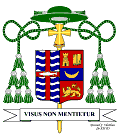 |
 |
|||
 |
||||
| Bishop Speaks | ||||
 |
||||
| December 6, 2007 Edition | ||||
 |
||||

  
|
Starting new year:
|
|||||||||||||||||||||||
 |
 |
|
 |
|
 |
||||
(printable version)
(en Español)
Dear Friends,
We now enter into the season of Advent, which is the beginning of a new Church year. Advent is also the season of hope and last Friday our Holy Father issued his second encyclical precisely on the Theological Virtue of Hope. I hope to offer comment on that second encyclical, entitled Spe Salvi, as soon as possible, when I have had more time to study and pray over it.
But for now, as we begin a new Church year with the season of Advent, perhaps the custom of making New Year's resolutions is appropriate in our Church context.
Just about a year ago, on December 22, 2006, Pope Benedict, in his address to his co-workers in the Vatican, indicated the problem of a "discontinuity hermeneutic" in the Church. I have repeated these words many times over the past year - not always to the pleasure of those who have heard them. The phraseology is rather tortuous and the meaning of these words is not necessarily obvious. Our Holy Father, a year ago, made the point to his co-workers that there must be a dynamic continuity in the doctrine, the discipline, and the liturgy of the Church as we move forward in history, because it is the same Holy Spirit who inspires the doctrine, the discipline, and the liturgy.
The Holy Spirit could never be more present to the Church at one point in history than at another - that would amount to heresy and would be contrary to the very nature of God and of His Church. The Church is the Body of Christ, enlivened by His Holy Spirit as our soul throughout all of history. And so, there can never be a moment of discontinuity or rupture in the Church, separating us from all that has gone before. There can never really be a pre-Vatican II Church and a post-Vatican II Church - there is only one Church of Jesus Christ, His body, on the march through history, toward the fullness of the Heavenly Kingdom.
Cardinal Dulles' reflections on Vatican II
It is against this background that I ask you to reflect on the words of Cardinal Avery Dulles, published ten years before Pope Benedict's address to his co-workers at the Vatican last December, and to reflect with me on a few points from the Cardinal's writings.
An excerpt from A Testimonial to Grace by Cardinal Avery Dulles, S.J. (pages 131-133), published in 1996:
This crisis is manifest in the conflict of interpretations of Vatican II. In the first decade after the Council, extending roughly to 1975, the dominant trend was to stress the novelty of the Council and to treat its reaffirmations of earlier Church teachings as mere concessions to a minority of conservative bishops who lacked the true spirit of Vatican II. Following the logic of this hermeneutic, many commentators felt impelled to go beyond the Council, to reject its compromises, and to work for a Church that is more modern, more democratic, more open to change.
I have been increasingly conscious of the inadequacies of this interpretation. Although Vatican II did speak with accents that were genuinely new, the Council Fathers were very serious in wishing to stand in continuity with the teaching of earlier popes and councils. In union with the whole Catholic tradition they were convinced that the Church was a visible society, divinely founded, and subsisting in the Roman Catholic communion of the present day. They maintained that the popes and bishops could teach with the authority of Christ, govern as Christ's representatives, and celebrate the sacraments as participants in his priestly office. The Catholic Church, according to Vatican II, was a "necessary" society in the sense that all are bound to adhere to its teaching, to join it, and remain within it as members. Only inculpable ignorance can excuse one from these obligations. All of these traditional affirmations were seen by the Council Fathers - rightly, I believe - as matters of faith.
These central teachings of Vatican II are widely contested or ignored. In countries such as our own it is not difficult to encounter Catholics who, perhaps under the influence of secular models of society, speak of the Church as if it were a humanly instituted community that could change its teaching, its sacramental worship, and its forms of government at will. These Catholics regard the Church not as a necessary society but rather as a voluntary association of individuals who share a common project. In some circles one finds a species of Catholic congregationalism, in which it is assumed that any group of worshippers would have the right to authorize some of its own members to celebrate the liturgy. This congregationalism is combined with a kind of religious consumerism, according to which local churches would be entitled to modify doctrines and liturgical texts to suit the current state of public opinion and the tastes of the worshippers. Instead of being bound to conform themselves to the teaching discipline of the Church, individuals would be morally free to opt out of the Church if it ceased to respond to their wishes and reflect their views.
As I read Cardinal Dulles' reflection, written a full ten years before the commentary of our Holy Father, I found a particular enrichment in his use of the terminology "religious consumerism," which he defines as the entitlement "of local Churches to modify doctrines and liturgical texts to suit the current state of public opinion and the tastes of the worshippers." He says directly, "Instead of being bound to conform themselves to the teaching discipline of the Church, individuals would be morally free to opt out of the Church if it ceased to respond to their wishes and reflect their views."
Resolutions for the new Church year
I began my reflection with talk of New Year's resolutions for the new Church year. Considering both the words of our Holy Father and of Cardinal Dulles, it might surprise no one that my personal New Year's resolution is to continue to offer leadership - lovingly, gently, firmly - in the direction of moving away from the discontinuity hermeneutic, moving away from the concept that there is a rupture between pre-Vatican II and post-Vatican II Catholicism, moving away from the notion that Pope Benedict or myself are leading us "backwards," and moving away from "religious consumerism," where Catholics shop for the particular approach which they consider desirable and reject that which they find undesirable.
Several groups within the Church have indicated that Catholics could, "vote with their pocketbook" and withhold donations when their particular approaches and desires are not satisfied. This is precisely the kind of "religious consumerism" which we should avoid at all costs because, as Cardinal Dulles says, we are the Church of Christ, we are "a necessary" society in the sense that all are bound to adhere to the Church's teachings, to join it, and to remain within it as members - only invincible ignorance can excuse one from these obligations - all of these traditional affirmations were seen by the council fathers, rightly I believe, as a matter of faith.
I hope you will join me in making a "New Year's" resolution for the new Church year that we will strive truly to become more the Church of the real Vatican II in the New Church year, 2008. Thank you for reading this. God bless each one of you. And may every blessing of the Lord's Hope be yours in this new Church year.
Praised be Jesus Christ!
| Jump to: Top of page |
| Official Appointment | |||
Bishop Robert C. Morlino announces the following appointment: Reverend Jared M. Hood as Parochial Vicar of St. Aloysius Parish cluster in Sauk City, linked with St. Mary Parish, Merrimac, and St. Norbert Parish, Roxbury. Most Reverend Robert C. Morlino |
| Jump to: Top of page |
| Front page Most recent issue Past issues |
Offices and mailing address: Bishop O'Connor Catholic Pastoral Center, 702 S. High Point Rd., Madison, WI 53719
Phone: 608-821-3070 Fax: 608-821-3071 E-Mail: info@madisoncatholicherald.org
